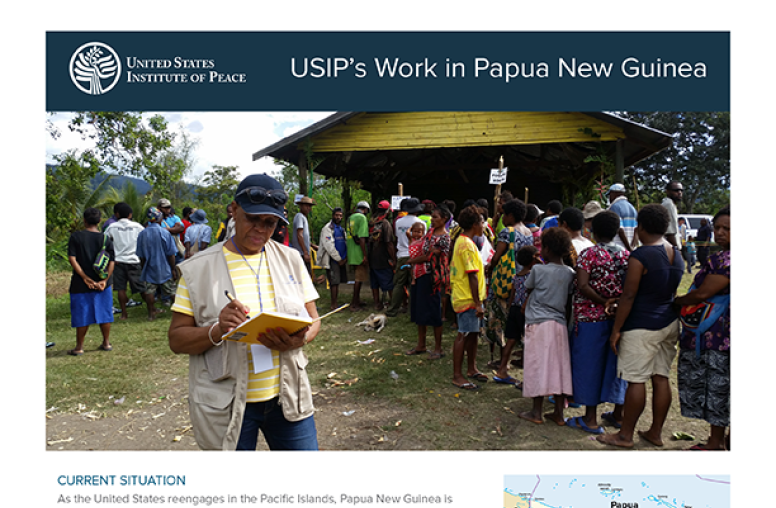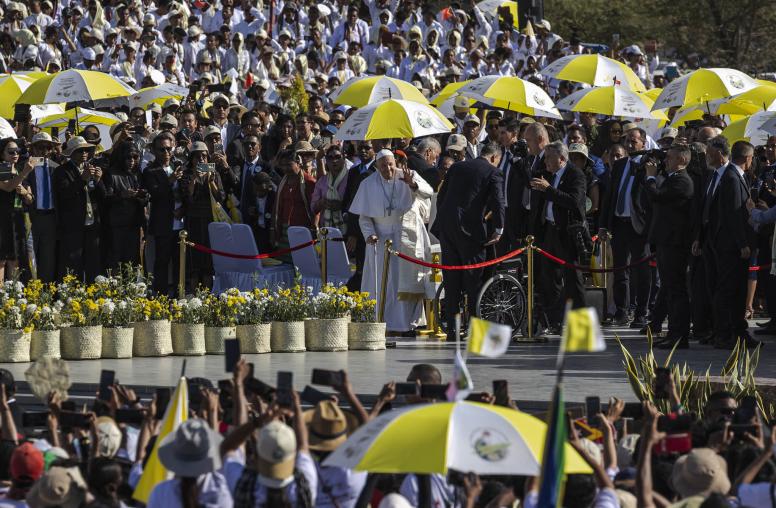Why Are Papua New Guinea’s Elections Plagued with Problems?
The island nation’s election quality is so poor it is jeopardizing the country’s democracy.
Papua New Guinea’s 2022 elections suffered from a host of problems, following a pattern plaguing the country’s polls for years. At least 50 people died in election-related violence. Post-election fighting in the country’s Highlands region contributed to a rapid rise in internally displaced people. Election observers estimated that in some places as many as half of all voters could not vote owing to problems with the roll. Voting was disrupted and ballot boxes hijacked in places, and violence prevented vote counting from being completed in at least two national electorates. There is now an urgent need for the international community to intensify their work with the government of Papua New Guinea to ensure that future elections improve and that the country’s democracy is preserved.

Even before 2022, Papua New Guinea was ranked in the bottom 10 percent of all countries globally in terms of electoral quality in the Electoral Integrity Project’s Perceptions of Electoral Integrity index and in the bottom quarter of all countries globally in V-Dem’s Clean Elections index.
Electoral problems in Papua New Guinea stem from a suite of interacting issues. To give interested international actors a better understanding of the issues at hand, and how they can be addressed, this briefing outlines Papua New Guinea’s electoral challenges.
National Neglect
A common complaint is that Papua New Guinea’s electoral commission rigs elections. It is true that commissioners’ positions are perilous and, as a result, they are willing to turn a blind eye to serious problems in some electorates. However, currently there is a lack of convincing evidence of systematic nationwide electoral fraud involving the national electoral commission.
The central problem with Papua New Guinea’s national electoral commission is that, for the most part, it is neglected. This neglect stems from the nature of parliamentary politics in the country, where national political allegiances are fluid. Parties are weak and political groupings in the parliament tend to be held together by money and expediency. The resulting political fluidity stifles national political action, including beneficial and needed reforms. However, it does also have the benefit of making it hard for groups of like-minded members of parliament (MPs) to engage in the sustained collective action needed to capture the national electoral commission and use it to rig elections from the center.
Another aspect of the country’s politics has undermined the national electoral commission and its capacity to prepare for elections: the patron-client nature of Papua New Guinea’s politics, which provides MPs with little incentive to worry about how well elections are being run. The problem stems from the fact that Papua New Guinea’s voters tend to vote for candidates who they believe will directly help them, their families or their communities. Voters do not normally choose who to vote for on the basis of national issues, or how well the country is being governed.
Voting this way is reasonable enough — many voters are poor, have immediate needs and have never seen policy changes help with those needs. However, this incentivizes MPs to focus on the localized distribution of patronage, rather than governing the country as a whole, leading to all manner of governance problems, including the neglect of electoral quality. As a result, Papua New Guinea’s national electoral commission and electoral apparatus is perennially run down. It is almost always underfunded, particularly in the early stages of the electoral cycle, when crucial planning is required.
Local Diversity
Because the country’s national electoral commission is neither captured by powerful politicians, nor well-functioning, much that is important for electoral quality in Papua New Guinea is determined at the local level. The quality of provincial governance varies considerably across Papua New Guinea’s 22 provinces. In much of the country, social diversity prevents individual strongmen from capturing provincial electoral commissions. However, in other places, particularly in the Highlands, which is home to 43 of Papua New Guinea’s 118 electoral districts, local actors are sometimes strong enough to intimidate provincial electoral officials at key points, such as when the roll is being compiled, and successfully engage in electoral fraud.
The quality of elections in Papua New Guinea can vary all the way down to individual polling stations. Some polling stations are safe, and the presence of scrutineers working for a range of different candidates tends to make cheating hard, and so electoral rules are often followed quite well. At other polling stations, particularly in parts of the Highlands where clans tend to be larger and more cohesive, individual polling stations often fall within the territory of individual candidates whose supporters are able to restrict others from monitoring them, and then cheat without impediment. Anthropologist and election observer Nicole Haley provides a vivid description of what can happen when this occurs from the Koroba-Lake Kopiago electorate during the 2007 election: “[A]t several polling stations polling officials were observed to be issuing pre-marked ballot papers. At other polling stations groups of young men were issued with entire books of ballot papers, which they were observed to complete en masse.”
The normalization of violence, particularly in the Highlands, also exacerbates how elections are run. Often violence has its origins in the prevalence of non-election-related conflict, which has spilt over into the electoral domain. Violence at times also stems from distrust or frustration with issues such as roll problems. Regardless of its origins, electoral violence also has a tendency to become self-perpetuating: if the last election was violent, candidates and their supporters expect the next one to be violent, too and are more likely to engage in pre-emptive or retributive violence. Violence is also a source of other electoral problems in Papua New Guinea. Surveys from the 2017 election show that violence and intimidation contribute to the gendered nature of politics in Papua New Guinea, with more women than men suffering from intimidation when trying to vote.
Given this, it is particularly worrying that in 2022 violence spread to parts of the country outside of the Highlands. As it stands, Papua New Guinea’s stretched security forces struggle to manage electoral violence in the Highlands. If violence were to become normalized in numerous other places, security forces would be unable to contain the issue.
What Goes Right?
Although problems such as fraud and violence seriously mar the electoral process in Papua New Guinea, a true picture of elections in the country also needs to acknowledge what goes right. Most voters want nothing more than to vote, and do so despite danger, discomfort and long waits. In much of the country, electoral officials do their best, often with limited training and support. At times, social capital and informal institutions allow communities to run elections well amid broader problems. And, as I noted above, the presence of scrutineers at polling stations often reduces polling fraud. Ballots are counted at district or provincial centers, allowing most candidates to have scrutineers present. Complaints about scrutineers being noisy and slowing counting are common, but their practice adds to transparency, reduces counting fraud and increases trust in the counting process.
International Influences
It is hard to obtain detailed estimates of the source of electoral funding in Papua New Guinea. However, in the 2017 election, Australia, which is by far the largest provider of electoral assistance, funded about 10% of electoral costs. Almost all other electoral funding came from the government of Papua New Guinea itself. It is likely that final numbers for 2022 will be similar.
Because most electoral funding in Papua New Guinea comes from domestic sources, it is unlikely that international actors can transform the quality of its elections without substantially upping assistance. And while electoral assistance is only a small slice of total Australian aid to Papua New Guinea, there currently appears no appetite to shoulder this burden.
However, even absent an increase, donors can help. Papua New Guinea politicians’ tendency to neglect electoral quality also mean they don’t usually work to prevent donor-funded improvements. In neighboring Solomon Islands, which has a similar political economy, donors have worked alongside the national electoral commission to improve elections over the last two decades.
At present there are three core constraints on more effective international electoral assistance.
In Australia there has been little political enthusiasm for pressuring Papua New Guineas’ political leaders to improve elections. Over much of the last decade Australia housed its asylum seekers there. Now, Australia wants Papua New Guinea on its side as it engages in geostrategic competition with China. As a result, Australian politicians are reluctant to alienate the country’s leaders.
The second constraint is more mundane: Papua New Guinea holds elections every five years. The long duration between elections, combined with the rotation of aid agency staff, stymies the institutional acquisition and preservation of election knowledge. It also makes it hard for donor staff and the electoral commission to build and maintain relationships. In theory, the use of contractors and similar interlocutors can help overcome this problem, but even among specialist organizations five years is a long time.
The third challenge is choosing the most effective entry-points amid the complex and diverse electoral problems facing Papua New Guinea. For an external actor, it can be hard to choose where resources should be effectively spent. Should they focus on particular provinces, helping provincial electoral commissions? If so, should they work in the troubled Highlands region, or in parts of the country where problems are of a more manageable scale? Or perhaps they should focus on shoring up the neglected national electoral commission? For any donor, understanding where they can best fit into broader efforts to improve electoral quality requires sound contextual knowledge.
Taken together, these challenges can appear daunting, but to-date even comparatively modest amounts of international assistance have helped electoral quality in Papua New Guinea somewhat. The challenge ahead is not overcoming failure, but rather improving to meet the serious electoral issues Papua New Guinea faces.
This is important work. Papua New Guinea is one of a small group of developing countries that has remained democratic throughout its post-independence history. But electoral quality is now so poor it is jeopardizing Papua New Guinea’s democracy. Frustration within the country is rising. And a future collapse of the electoral process is not beyond the realms of possibility.
Terence Wood is a research fellow at the Development Policy Centre. His research focuses on political governance in Western Melanesia, and Australian and New Zealand aid.



